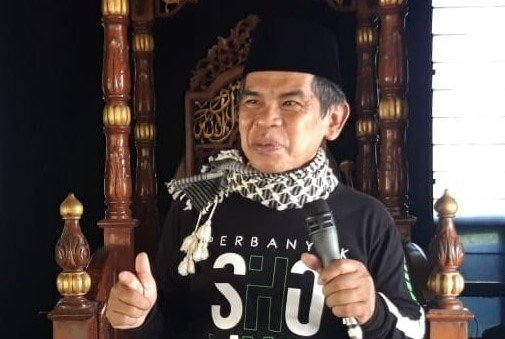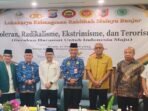by: HM Syarbani Haira *)
Commemoration of the Birth of Pancasila June 1 2023 is carried out in a state manner, at the Presidential Palace, Bogor. Acting as Inspector of Ceremonies, President Joko Widodo. Remarkably, this populist president appeared in the uniform of the people of Tanah Bumbu Regency, South Kalimantan. This is of course very proud.
In this event, the Chairman of the Steering Committee for the Pancasila Ideology Development Agency (BPIP), Megawati Soekarnoputri, as well as the Chairperson of BPIP Prof. Yudian Wahyudi, and a number of important officials in this country were seen.
In his short remarks, President Jokowi invited the Indonesian people to make Pancasila the foundation for the development of Indonesian science and technology.
He added that the expansion and deepening of Pancasila values could not be done in the usual ways. Extraordinary new methods are needed. Utilizing the development of science and technology, especially the industrial revolution 4.0, said the former governor of Jakarta.
History of Pancasila
In its history, there has been a long debate in this country about the Birthday of Pancasila.
Then, based on Presidential Decree No. 24 of 2016, June 1, is recognized as an important day in the Indonesian nation’s calendar. This date is then commemorated as the Birthday of Pancasila.
The election of June 1 as the Birthday of Pancasila refers to the moment of the Dokuritsu Junbi Cosakai (Investigation Agency for Preparatory Work for Independence/BPUPKI) meeting in an effort to formulate the basis of the Republic of Indonesia.
This body held its first meeting on May 29, 1945. During the meeting, BPUPKI members discussed the foundations of an independent Indonesia.
At the second BPUPKI meeting, Soekarno in his speech entitled “The Birth of Pancasila” conveyed the idea of the initial concept of Pancasila which became the basis of the Indonesian state, precisely on June 1, 1945.
This speech was originally delivered by Sukarno without a title. The term “Birth of Pancasila” just appeared when the former Chairman of the BPUPKI, Dr. Radjiman Wedyodiningrat, gave a foreword in a book containing speeches, which were then recorded by BPUPKI.
Soekarno in his speech conveyed his ideas and ideas, related to the basis of the Indonesian state, which was named “Pancasila”. Panca means five, while sila means principle or principle.
Bung Karno mentioned five foundations for the Indonesian state. The first precept is “Nationality”, the second is “Internationalism or Humanity”, the third is “Democracy”, the fourth is “Social justice”, and the fifth is “Belief in One Almighty God”.
To perfect the formulation of Pancasila and create a Constitution based on these five principles, Dokuritsu Junbi Cosakai formed a committee called the “Committee of Nine”. Each Ir. Soekarno, Mohammad Hatta, Abikoesno Tjokroseojoso, Agus Salim, Wahid Hasjim, Mohammad Yamin, Abdul Kahar Muzakir, Mr. AA Maramis, and Achmad Soebardjo.
After going through several trial processes, Pancasila was finally ratified at the PPKI Session on August 18, 1945.
At the meeting, it was agreed that Pancasila was included in the Preamble of the 1945 Constitution as the legal basis of the Indonesian state.
That is the history of Pancasila Birthday that we need to remember. But not only to be remembered, the Birth of Pancasila is also a moment to remember, respect, and at the same time appreciate the struggle of the nation’s founders in formulating the basis of the Indonesian state.
The Responsibilities of the Next Generation
In many publications it is stated that the next generation and all the nation’s children must be able to interpret Pancasila as the basis of the state and as the basis for behavior in the life of society and the state.
Pancasila as the basis of the state, state ideology, and the nation’s way of life, which was explored and determined by the founders of this nation, is of course an incomparable gift from God Almighty for the Indonesian nation. Pancasila is a unifying tool for the nation.
With the birth of these five precepts, Pancasila can unite people with all the differences that exist.
The practice of Pancasila values is a manifestation of love for the Motherland so that it can build a better nation and state.
Pancasila values can be practiced in simple forms, such as mutual respect, cooperation and mutual respect.
Thanks to Pancasila with the values of inclusivity, tolerance and mutual cooperation, the existing diversity is a guiding blessing for diversity which can be woven into the national identity of Bhinneka Tunggal Ika.
Therefore, it is time for all individuals and children of the nation, and as part of all components of the nation and society of Indonesia, to commit to commemorating the Birthday of Pancasila, every June 1, as part of the mainstreaming of Pancasila in all areas of social, national and state life. .
Another urgent note, the history of the creation of Pancasila begins with the promise of independence at a later date to the Indonesian nation by the then Japanese Prime Minister, Kuniaki Koiso on September 7, 1944.
Then, the Japanese government formed the BPUPKI (Investigating Agency for Indonesian Independence Preparatory Efforts) on April 29, 1945 which aimed to study matters relating to the governance of Independent Indonesia.
BPUPKI originally consisted of 70 members (62 Indonesians and 8 special members of the Japanese nation who were not entitled to speak, only to observe or a kind of ”observer”), which was later added by 6 Indonesians at the second session.
The first meeting was held on 29 May 1945 to 1 June 1945 to formulate the basic state philosophy for the Indonesian state.
During the four days of the session there were thirty three speakers. The latest research shows that Soekarno was a digger/formular of Pancasila.
Other figures who contributed their thoughts on the Basics of the State include Mohamad Hatta, Muhammad Yamin and Soepomo.
On May 29, 1945 Muhammad Yamin put forward 5 principles for an independent Indonesian state, namely “nationality, humanity, divinity, democracy and people’s welfare.” The “Committee of Five” (Bung Hatta) doubted the truth.
In the A.G Pringgodigdo Archives and the A.K.Pringgodigdo Archives which have been rediscovered show that Yamin’s claim cannot be accepted.
On the fourth day, Soekarno proposed 5 principles, namely ”Indonesian nationality, internationalism or humanity, unity and oneness, social welfare, and belief in one and only God”, which Soekarno called ”Pancasila”. Soekarno’s speech was then received with great fanfare by the trial participants.
The history of the Birth of Pancasila really needs to be remembered and more importantly how can we interpret Pancasila as the basis of the State and as the basis for behavior in social life. wallahu’alam bis-sawab … !!!
*) Chairman of the Syuro Council of Masjid As-Su’ada Campus, Sheikh Abdul Kadir Hasan, NU University of South Kalimantan, Banjar, South Kalimantan










